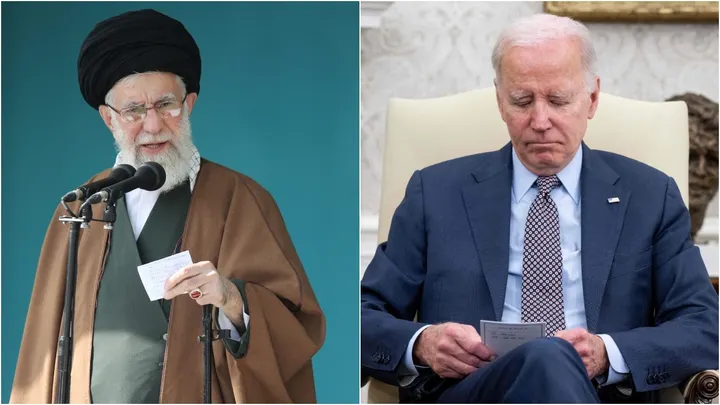The United States is moving towards implementing further escalatory measures against Iran. During a meeting of the Board of Governors of the International Atomic Energy Agency from March 4 to 8 of this year, the U.S. issued a threat to pursue a resolution against Iran if it fails to adequately cooperate with the agency. President Joe Biden reiterated this stance in a message to Congress on the 13th of the same month by extending the “national emergency” law regarding Iran for another year. He emphasized that “the actions and policies of the Iranian government continue to pose an unusual and extraordinary threat to the national security, foreign policy, and economy of the United States of America.”
These measures are not solely prompted by Washington’s mounting concerns over the escalation of Iranian nuclear activities or the expanding disputes in the Middle East region. They are also intertwined with internal American dynamics, particularly with the upcoming presidential elections scheduled for November 5th. This significance is magnified by the confirmation that former President Donald Trump will be the Republican competitor to President Biden in the elections.
Multiple Motives
Washington’s decision to extend the “national emergency” law regarding Iran can be interpreted in light of several considerations, the most prominent of which are:
1-Washington believes that extending the law enables it to maintain leverage against Iran, thereby counterbalancing the escalatory actions taken by Iran concerning its nuclear and ballistic missile programs, as well as its regional interventions, which the administration characterizes as “supporting terrorism.” This is particularly crucial given Iran’s close ties with armed militias in conflict-ridden nations, notably Lebanon, Syria, Iraq, and Yemen, some of which Washington designates as “terrorist organizations.”
From Washington’s perspective, this strategy strengthens its bargaining position with Iran, especially if negotiations resume regarding the nuclear program. During previous negotiations held between April 2021 and August 2022, one of Iran’s key demands was the lifting of a significant portion of U.S. sanctions, particularly those related to oil exports and the Revolutionary Guard.
2- President Joe Biden is confronted with significant internal pressure from factions within the Republican Party, as well as from former President Donald Trump and certain members of his previous administration. President Biden likely anticipates that the Iran issue will feature prominently in upcoming election campaigns, particularly given the stark differences in perspectives between the Republican Party and former President Trump on this matter.
The “prisoner swap” deal reached between Iran and the United States on September 18th of last year provided Republicans and former President Trump with ammunition to criticize President Biden. On that same day, Trump remarked, “This foolish hostage deal with Iran, valued at 6 billion dollars, sets a dangerous precedent for the future.” He added, “I brought back 58 hostages to the country from various nations, including North Korea, without paying a cent… Once you start paying, you’ll never stop, and more hostages will be taken… Biden incompetently handed over 6 billion dollars for the release of five individuals, with Iran gaining nothing in return for freeing them.”
3- Exploiting “Nuclear Threats” to Their Advantage: A notable shift in American policy towards Iran occurred following statements made by former head of the Iranian Atomic Energy Organization (and former Foreign Minister) Ali Akbar Salehi during a televised interview on February 11th of last year. Salehi analogized Iran’s nuclear program to a car manufacturing process, stating that “Iran possesses all the components of the car,” implying that Iran has nuclear capabilities that, if a political decision were made, could lead to the production of nuclear bombs.
These remarks prompted the International Atomic Energy Agency to redirect criticism towards Iran’s decreasing level of cooperation, laying the groundwork for American escalation against Tehran. This could manifest through threats to issue a resolution against Iran at a later stage or through the extension of the “national emergency” law. Such actions may indicate to Tehran that the hesitance of Western nations to take robust measures against Iran during the recent meeting of the Board of Governors of the International Atomic Energy Agency (held from March 4th to 8th of the current year) is a temporary stance, influenced by ongoing developments in the Middle East, including the Israeli conflict in Gaza and associated escalations across various regional fronts.
4- Escalation Continues Between Washington and Militias: Despite Iran’s apparent efforts to manage the level of escalation among its allied militias in countries like Lebanon, Syria, and Iraq, and the United States, particularly following recent strikes against some of these militias, notably the “Hezbollah Brigades,” in response to the attack on the U.S. base “T-22” in northeastern Jordan on January 28th of last year, Washington still views Iran as the primary instigator behind these militias. It believes that Iran could authorize further attacks against U.S. bases if it deems such actions align with its interests. Therefore, Washington perceives the reduction in activity by Iran-backed militias in Iraq and Syria aimed at targeting U.S. bases as potentially temporary, pending the emergence of circumstances conducive to resuming such attacks. This concern is heightened, particularly if Israel takes steps to broaden the conflict by engaging in direct warfare with Lebanese Hezbollah.
Counter Moves
Iran may be inclined to take countermeasures in response to this notable shift in American policy, particularly as the dynamics of competition unfold in the American presidential elections. Iran might announce new developments in its nuclear program while simultaneously escalating its missile program. Additionally, it may continue to support armed militias in the region, some of which are directly engaged in confrontations with Washington.


